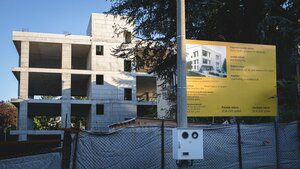
In July, Nemanja Stajić, who led the national Secretariat for Legalization of Objects for many years, left his job, but he is being investigated for wrongdoing. Developers claim he asked for big bribes to make the built buildings "legal".
Below is a brief summary and overview of the key findings of the investigation. You can read the main version in English here.
The prosecutor’s office suspects the former head of the Serbian Secretariat for Legalization of Objects of misusing his position
On October 6, the day this investigation was published, prosecutors questioned Nemanja Stajic. The prosecutor’s office confirmed that an investigation was ongoing, but refused to reveal details.
In May, KRIK, a Serbian partner of OCCRP, released an investigation into how corrupt officials and unscrupulous developers benefited from legalization at the expense of Serbian citizens. Several experts stated that Nemanja Stajic orchestrated this corruption scheme.
Amid a construction boom in the Serbian capital, it has become common to construct buildings first and obtain permits later. According to experts, Belgrade is marred by hundreds of thousands of unlawfully constructed buildings.
The issue arose in the 90s and early 2000s: the capital of Serbia, affected by wars and sanctions, was compelled to accommodate about a million refugees, leading to a surge in illegal construction. Many houses built during that time were never officially registered.
Illegal development was disregarded as the state needed to address the demand for housing. The Secretariat for Legalization of Objects, established by a special Law on Legalization in 2015, was meant to resolve the problem. The secretariat was led by Nemanja Staich.
If someone has a building that has never been officially registered or doesn’t comply with regulations—for example, it’s too close to another building or lacks the required parking—you can go to the Secretariat, pay, and "legalize" the building retroactively.
This system was meant to assist in bringing buildings into compliance with building codes and registering them, which would simplify the registration of property rights, taxation, and sale.
But in reality, developers have the chance to build houses against all norms, and then "legalize" them for a bribe.
The effort to legalize buildings in Belgrade turned into bribes and the continuation of “wild building”
According to experts, obtaining a building permit in Belgrade legally is lengthy and challenging. This can take up to a year, and you will need to visit up to 18 institutions, most of which you will have to pay. And if you give a bribe in the Secretariat, then construction can begin immediately, without waiting for permission. Once construction is completed, another payment must be made to have the surveyor’s satellite imagery backdated. Then it will seem that the building was constructed before 2015, and therefore it is subject to legalization.
Staich refused to comment.
A company owned by the offshore firm of Brother Nemanja Stajic built a building in Belgrade one floor higher than the agreed project
A Belgrade resident told reporters that last year a four-story building was built close to her house, after cutting down cherry and walnut trees.
Unfinished building in Belgrade. It was supposed to be three-story, the fourth floor was added illegally. The construction was started by Novak Staich’s company – this is the brother of the ex-head of the Secretariat Nemanja Staich.
As it turned out, Loyal Building, which is owned by the offshore firm of Nemanja Staich’s brother, was responsible for the construction. After obtaining a legal building permit, the developer illegally added another floor.




